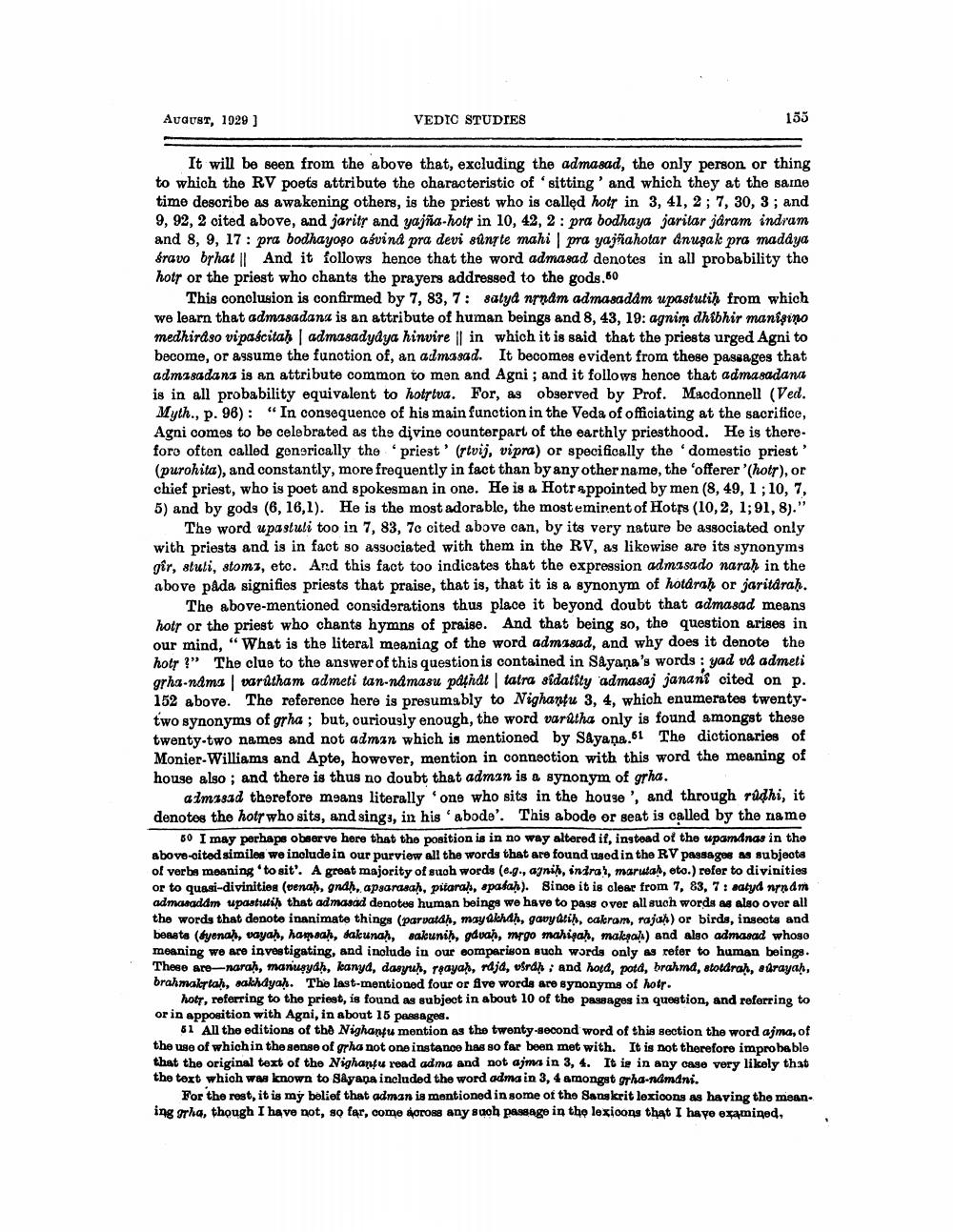________________
Avdust, 1929 ]
VEDIC STUDIES
155
It will be seen from the above that, excluding the admasad, the only person or thing to which the RV poets attribute the characteristic of sitting and which they at the same time describe as awakening others, is the priest who is called hotr in 3, 41, 2; 7, 30, 3; and 9, 92, 2 cited above, and jarity and yajña-hots in 10, 42, 2: pra bodhaya jaritar jaram indram and 8, 9, 17: pra bodha yoso asvind pra devi sunyte mahi | pra yajpahotar anuşak pro maddya Sravo bohat | And it follows hence that the word admasad denotes in all probability the hotr or the priest who chants the prayers addressed to the gods.60
This conclusion is confirmed by 7, 83, 7: satyd nonam ad masadam upastutih from which we learn that admasadana is an attribute of human beings and 8, 43, 19: agnim dhibhir manisino medhird so vipascitah admasadyaya hinvire l in which it is said that the priests urged Agni to become, or assume the funotion of, an admasad. It becomes evident from these passages that admasadans is an attribute common to men and Agni; and it follows hence that admasadana is in all probability equivalent to hotstva. For, as observed by Prof. Macdonnell (Ved. Myth., p. 96): "In consequence of his main function in the Veda of officiating at the sacrifice, Agni comes to be celebrated as the divine counterpart of the earthly priesthood. He is thereforo often called gonorically the priest' (tvij, vipra) or specifically the domestio priest' (purohita), and constantly, more frequently in fact than by any other name, the 'offerer' (hots), or chief priegt, who is poet and spokesman in one. He is a Hotrappointed by men (8, 49, 1; 10, 7, 5) and by gods (6,16,1). He is the most adorable, the most eminent of Hotps (10,2, 1;91, 8)."
The word upastuli too in 7, 83, 7c cited above can, by its very nature be associated only with priests and is in fact so associated with them in the RV, as likewise are its synonyms gir, stuli, stoms, etc. And this fact too indicates that the expression admasado narah in the above pada signifies priests that praise, that is, that it is a synonym of hotarah or jaritarah.
The above-mentioned considerations thus place it beyond doubt that admasad means hots or the priest who chants hymns of praise. And that being so, the question arises in our mind, "What is the literal meaning of the word admesad, and why does it denote the hoty ?" The clue to the answer of this question is contained in Sayana's words : yad vd admeti grha-nama varutham admeti tan-ndmasu påthat tatra sidatity 'admasaj jananí cited on p. 152 above. The reference here is presumably to Nighantu 3, 4, which enumerates twentytwo synonyms of grha ; but, ouriously enough, the word varatha only is found amongst these twenty-two names and not admin which is mentioned by Sayana.61 The dictionaries of Monier-Williams and Apte, however, mention in connection with this word the meaning of house also ; and there is thus no doubt that adman is a synonym of grha.
admasad therefore means literally one who sits in the house ', and through rudhi, it denotes the hot who sits, and sings, in his 'abode'. This abode or seat is called by the name
80 I may perhaps observe here that the position is in no way altered if, instead of the upandnas in the above-cited similes we include in our purview all the words that are found used in the RV pagsages as subjecte of verbs meaning to sit'. A great majority of such words (e.g., agnih, indral, marutal, eto.) refer to divinities or to quasi-divinities (venal, gndh, apsarasah, piiaral, apatah). Sinoe it is clear from 7, 83, 7 : adtyd nondm admcuadam upastutih that admasad denotos human beings we have to pass over all such words as also over all the words that denote inanimate things (parvatah, may alhah, gavyarih, cakram, rajah) or birds, insects and beasta (byenal, vayah, hamah, sakunah, saluni), gdvaḥ, mago mahiyah, makral) and also admasad whogo meaning we are investigating, and include in our comparison such words only as refer to human beings. These are-narah, manusyd), kanya, dasyuh, rộayar, rdja, usrah : and hotd, pota, brahmd, stotdrah, atrayah, brahmakrtah, sakhdyan. The last-mentioned four or five words are synonyms of hots.
hott, referring to the priest, is found as subject in about 10 of the passages in question, and referring to or in apposition with Agni, in about 15 passages.
61 All the editions of thò Nighantu mention as the twenty-second word of this section the word ajma, of the ugo of which in the sense of grha not one instance has so far boen met with. It is not therefore improbable that the original text of the Nighantu read adma and not ajma in 3, 4. It is in any case very likely that the tout which was known to Sêyana included the word adma in 3, 4 amongst grha-namdni.
For the rest, it is my belief that adman is mentioned in some of the Sanskrit lexicons as having the mean. ing grha, though I have not, so far, come scross any such passage in the lexioong that I have examined,




